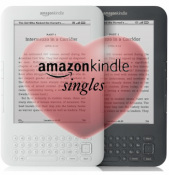
We’ve been frequent critics of Amazon’s tactics in conquering established book markets, but credit is due to the company for doing what many would have considered impossible: creating a genuine market for novellas and novella-length nonfiction. In the New York Times this morning, Leslie Kaufman profiles Kindle Singles editor David Blum and cites Amazon’s statistic that about 28 percent of the 345 Singles published since January 2011 have sold more than 10,000 copies. Kindle Singles are a curated list of short e-books (5,000 to 30,000 words in length) available through Amazon’s Kindle Store.
Though publishing arrangements vary — some Kindle Singles are published by traditional publishers, others are self-published or put out by an emerging group of new publishers, such as Byliner — authors may earn as much as 70% of the proceeds from sales. Since bestselling Kindle Singles sell for an average price of $1.50 or so, a self-published author selling 10,000 or more Singles would likely earn revenues of $10,000 or more.
The current bestseller list of Kindle Singles includes many familiar names writing in genres that do particularly well in e-book form — including crime fiction and thrillers. What’s especially welcome to authors and freelance journalists is the healthy number of nonfiction titles on the list. These include works of history (#4, Mayflower: The Voyage from Hell, by Kevin Jackson; #16, Always Right, by Niall Ferguson), memoirs (#15, Dresden: A Survivor’s Story, by Victor Gregg), essays, and long-form journalism (#3, Trial By Fury: Internet Savagery and the Amanda Knox Case, by Douglas Preston; #13, Guns, by Stephen King, who’s donating proceeds to the Brady Campaign to Prevent Gun Violence). Writing on science also makes a credible showing on the Kindle Singles bestseller list (#43, Higgs Discovery, The Power of Empty Space, by Harvard physics professor Lisa Randall), as do works Amazon categorizes as reporting (#29, Here’s the Deal, by David Leonhardt).
It’s early days for Kindle Singles, too early to judge the eventual breadth and depth of this market. According to Amazon’s own numbers, just 100 Singles have sold more than 10,000 copies so far. But the trend, by all accounts, looks promising: Amazon is curating a new, significant short e-book market for authors and readers.
 RSS Feed
RSS Feed